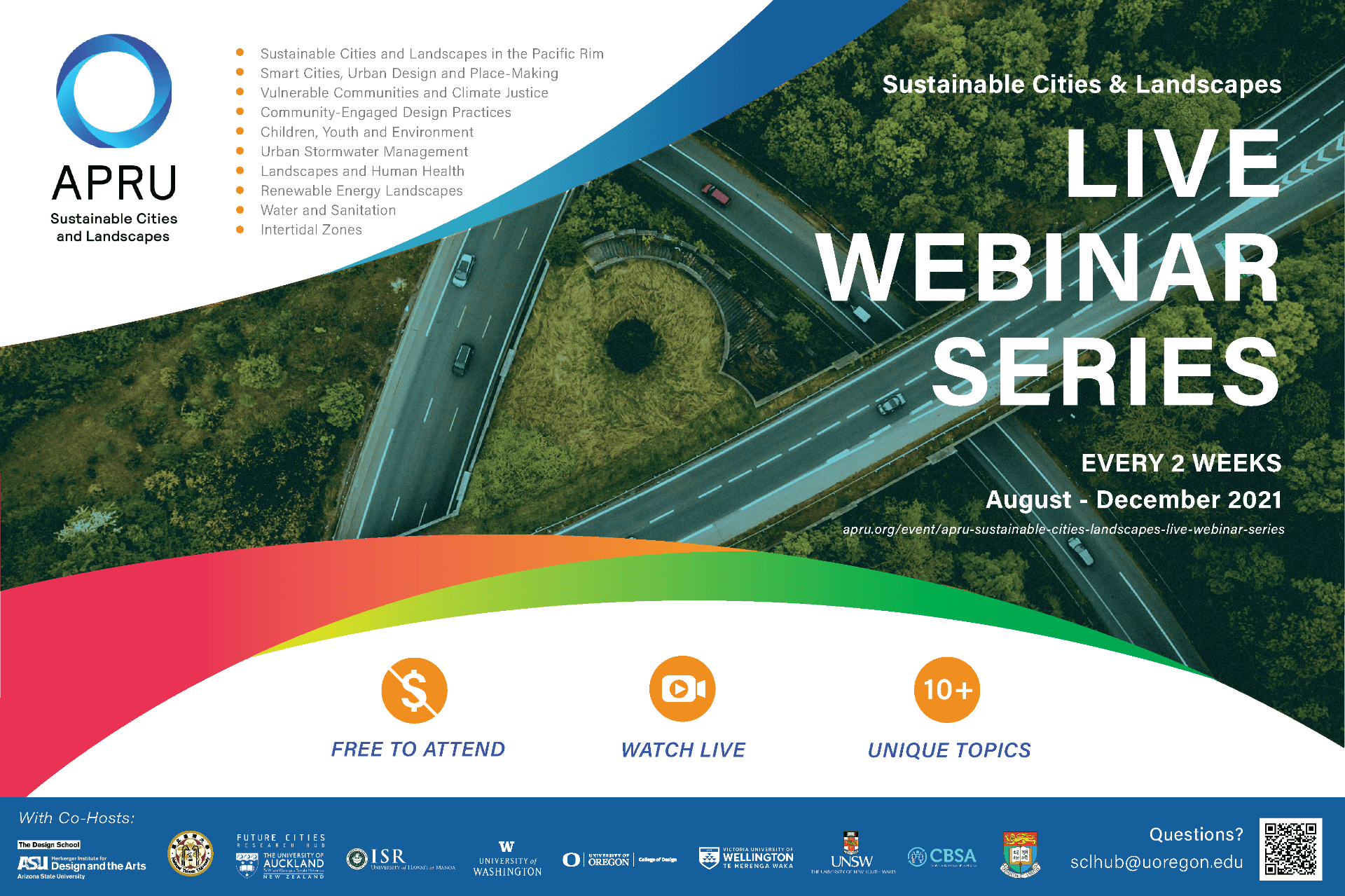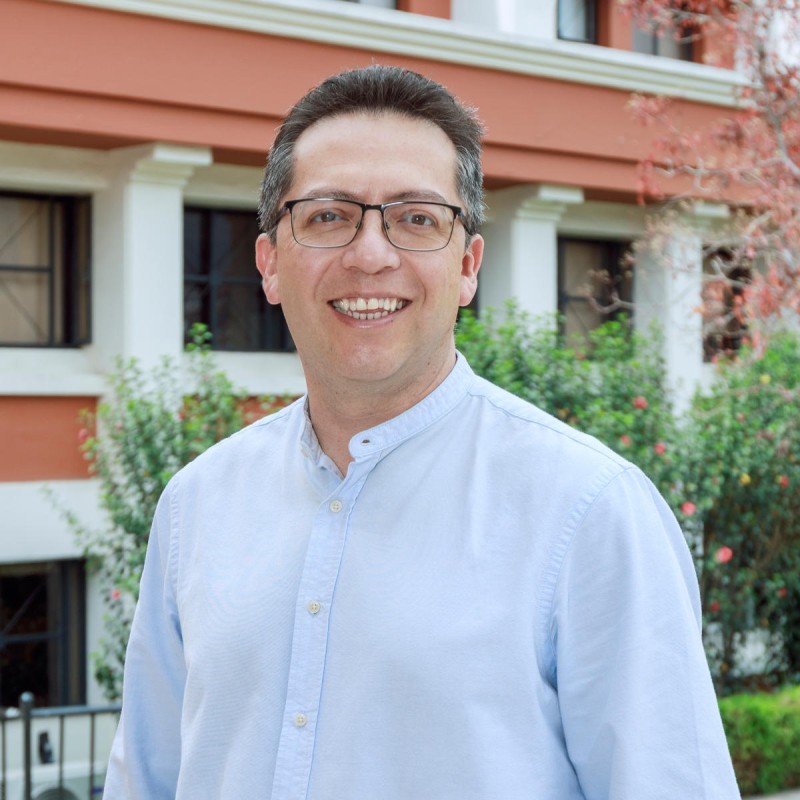Upcoming events
2024-2025 Sustainable Cities and Landscapes Speaker Series – Funded by the Global Justice Program
We are excited to highlight the work of seven SCL members from across the Pacific Rim and share their expertise with the UO campus. Three of these speakers are from the United States, and the other four are from China, Canada, Philippines, and Columbia. Collectively, these speakers will provide a diverse set of perspectives on equity, climate resilience, and community engagement within their regions related to the United Nations’ Sustainable Development Goals (SDGs). This series is graciously funded by the Global Justice Program and the HOPES Conference.
Professor Jaime López
April 2025 – location and time TBD
Lecture will be a part of the HOPES Annual Conference
Professor Lopez is an architect who graduated from the Universidad San Francisco de Quito (USFQ) in 2001. He earned his MSc in Architecture at TU Delft in The Netherlands in 2009 and obtained a Doctorate in Architectural Projects from the Polytechnic University of Catalunya (UPC) in 2022. His doctoral thesis focuses on researching the interaction between urban morphology and the physical geography of natural protected spaces, using the Galápagos archipelago as a case study. Professor Lopez is the founder of the international architecture studio in the Galapagos Islands, which initiated research on human settlements in the Galápagos from a design perspective. He currently serves as the director of the Architecture and Urban Form Research Institute (AFORU) at USFQ and as the community outreach coordinator for the School of Architecture. Additionally, he works as a private consultant in urban and regional planning for both public and private institutions. Professor Lopez’s visit is co-sponsored by the Global Justice Program and HOPES Conference. While on campus he will provide a public lecture, classroom visits, and meet with students and faculty.
May 2025 – Time and location TBD
A Professorial Lecturer at the College of Architecture, University of the Philippines, Dr. Cajilig will focus on the materialities of disaster injustice in post-disaster housing reconstruction in an island community. She will employ anthropology and architecture methods to explore how injustice manifests in housing reconstruction, identifying key material registers that reveal social, economic, and political realities in disaster contexts. The SDGs involved are Reduced Inequalities, Sustainable Cities and Communities, and Climate Action.
Past Events
2024-2025 Sustainable Cities and Landscapes Speaker Series – Funded by the Global Justice Program
January 15th, 2024 – Lawrence Hall 115 from 5-6:30pm
A Senior Lecturer of Landscape Architecture at the University of Hong Kong, Ms. Echeverri will discuss the integration of ecology into landscape architecture education and practice. Her lecture will highlight interdisciplinary collaboration challenges and showcase practice-based projects that address sensitive sites and transform traditional aquaculture landscapes in Southern China. The SDGs touched upon include Sustainable Cities and Communities, Climate Action, and Life on Land.
 Makena Coffman, Ph.D. – Challenges and Opportunities of Sea Level Rise Response for Hawai‘i
Makena Coffman, Ph.D. – Challenges and Opportunities of Sea Level Rise Response for Hawai‘i
November 5, 2024, 2pm – Gumwood Room, EMU
As an island community with world-famous beaches, Hawai‘i’s coastal managers face significant challenges in the face of sea level rise (SLR). Shoreline laws have recently been updated to limit further shoreline hardening, making Hawaiʻi a salient case study to understand the challenges and opportunities around managed retreat. We interviewed 42 private sector, civil society, and government actors involved with coastal governance and anchored our conversations to three distinct communities on O‘ahu. Factors that affected participant perspectives on the viability of retreat per site hinged on: 1) physical/natural barriers and opportunities; 2) perceptions of the public value of a beach; 3) the importance of existing infrastructure; and 4) the political influence of coastal homeowners. Participants’ views on who should inform the coastal planning process moving forward varied by site. In addition to residents, there was largely agreement that communities should include those with affinity and long-standing relationships with place.
Coffman serves in a dual capacity as the Director for the Institute for Sustainability and Resilience and a professor in the Department of Urban and Regional Planning at the University of Hawai‘i at Manoa. Her interests include greenhouse gas reduction strategies; renewable energy planning and policy; low-carbon transportation; and sea level rise response. She specializes in regional economy-environment modeling with expertise in energy and climate policy. Her current research assesses energy planning and regulatory mechanisms to help Hawai‘i and the U.S. meet their clean energy goals, including low-carbon transportation options, as well as research on the economic and social impacts of sea level rise in Hawaiʻi. Makena is also a Research Fellow with the University of Hawaii Economic Research Organization.

Andreanne Doyon, Ph.D. – Just Nature-Based Cities
May 17, 2024, 4pm – Lawrence Hall 115
Dr. Andreanne Doyon is an Assistant Professor of Planning at Simon Fraser University’s School of Resource and Environmental Management, Dr. Doyon will present on nature-based solutions in urban infrastructure. She will discuss how these solutions contribute to resilient, livable, and equitable cities, emphasizing the integration of justice in planning and governance processes. Dr. Doyon will use case studies to highlight the importance of local and Indigenous knowledge. The talk aligns with SDGs on Reduced Inequalities, Sustainable Cities and Communities, and Life on the Land.
October 22nd, 2024 – 6:30 pm – 8:00 pm Pacific Time / October 23rd, 9:30-11:00 am Hong Kong/ Singapore.
This will be an engaging webinar discussion, featuring Nico Larco, Professor of Architecture, and Kaarin Knudson, AIA, MArch ’07, as they delve into their latest publication, “The Sustainable Urban Design Handbook.” This comprehensive handbook builds upon their extensive research and gathers best practices from various disciplines to advance sustainable urban design principles. In an era where urban areas host over half of the global population and face increasing climate uncertainties, this handbook provides a crucial framework for design and planning professionals, community stakeholders, students, and policymakers striving to create sustainable communities for the future.
Speakers:
- Prof. Nico Larco, School of Architecture and Environment, Director of Urbanism Next Center, University of Oregon, USA
- Kaarin Knudson, Mayor of the City of Eugene, USA
Moderator:
- Prof. Paola Boarin, School of Architecture and Planning, Director of the Future Cities Research Hub, University of Auckland, New Zealand

October 15th, 6:30 pm – 8 pm Pacific / October 16th, 9:30 -11:00 am Hong Kong/Singapore.
Discover the APRU Biodiversity for Sustainable Cities Webinar Series 2024, jointly organized by the APRU Biodiversity and the APRU Sustainable Cities & Landscapes Programs, in partnership with The Chinese University of Hong Kong, Shanghai Jiao Tong University, and The University of Sydney. This series tackles the pressing issue of biodiversity loss in urban environments, convening researchers, practitioners, educators, students, and stakeholders to explore innovative solutions.
Dive into discussions on integrating biodiversity conservation into urban development strategies for a sustainable future. Stay tuned for session schedules and registration details, coming soon.
Speakers:
- Prof. Gail Langellotto, Department of Horticulture, Oregon State University, “Cultivating Biodiversity in Small Spaces: Plants, People, and Practices”
- Dr. Sohyun Park, Department of Plant Science and Landscape Architecture, University of Connecticut, “Biodiversity-Positive Design: Empirical Evidence and Case Studies”
-
Ms. Jennifer Rae Pierce, Co-founder and COO, Urban Biodiversity Hub, PhD Candidate at University of British Columbia in the department of Community and Regional Planning
Moderator:
- Prof. Yekang Ko, School of Architecture & Environment, University of Oregon

Join us for the APRU Student Global Climate Change Simulation 2024, a dynamic online roleplaying exercise where students from diverse backgrounds will represent international teams at the UN Climate Change Negotiations. Facilitated by experts, participants will explore topics such as coastal habitats, deforestation, clean energy, trading and offsets, and diplomacy and negotiation skills. The simulation includes interactive sessions using tools like the World Climate Interactive and C-ROADS simulation model, supplemented by lectures and curated materials accessible on our shared Canvas website.
Date & Time:
Opening ceremony/KICKOFF
August 22 at 6-8:30pm
Group meetings
August 29 at 6-8pm
Day 1 simulation
September 5 at 6-8:30 pm
Day 2 simulation
September 12 at 6-8:30 pm
SCL Speakers in partnership with the HOPES Conference
*Find YouTube recordings of speakers here.
Jeff Hou: Catalyzing Change, Empowering Design – April 19, Friday 5:30 pm, LA 177
Dr. Hou is a Professor of Landscape Architecture at the University of Washington in Seattle, Dr. Hou will address the role of design in catalyzing positive social and environmental change. He will explore how design, historically used to maintain the status quo, can now empower communities in urban settings. The focus will be on parks and open spaces as solutions to urban density and promoting healthy living. SDGs covered include Global Health and Wellbeing, Reduced Inequalities, and Sustainable Cities and Communities.
Panel: Designing the future: Global engagement in design education – April 20, Saturday 11:30pam, LA 177
This panel will explore the significance of global engagement within design education, drawing from their collective experiences in international design studios, field schools, design conferences, and study-abroad initiatives. Specifically, the discussion will highlight upcoming opportunities for students available through the Sustainable Cities and Landscapes Hub, an initiative of the Association of Pacific Rim Universities (APRU). This hub includes 21 universities around the Pacific Rim, focusing on place-based design and planning strategies to meet the United Nations Sustainable Development Goals. It is based at the University of Oregon.
Panel: Collaborative Practice Along the Margins of Science and Place: The Burke Meadow – April 21, Sunday 10am, LA 177
Dr. Yocom, an Associate Professor and Chair of the Department of Landscape Architecture at the University of Washington, Seattle, collaborates with Polly Olsen, Director and Tribal Liaison at Burke Museum. They will discuss their collaborative project at the Burke Museum’s native food meadow, emphasizing the intersection of cultural, scientific, and design education. Their session will delve into the practice of aligning professional perspectives and intentions. The relevant SDGs are Sustainable Cities and Communities, Life on Land, and Peace, Justice, and Strong Institutions.
Dr. Doyon is an Assistant Professor of Planning at Simon Fraser University’s School of Resource and Environmental Management, Dr. Doyon will present on nature-based solutions in urban infrastructure. She will discuss how these solutions contribute to resilient, livable, and equitable cities, emphasizing the integration of justice in planning and governance processes. Dr. Doyon will use case studies to highlight the importance of local and Indigenous knowledge. The talk aligns with SDGs on Reduced Inequalities, Sustainable Cities and Communities, and Life on the Land.
Live Webinar Series

The APRU Sustainable Cities and Landscapes brings researchers and scholars together from across the Pacific Rim to engage in cross-cultural conversations around climate justice, sustainable, and social equity. Tune in to our biweekly webinar sessions this fall to learn how cities around the world are working towards achieving the United Nations’ Sustainable Development Goals in their own contexts.
To learn more about each webinar session and how to attend, click on the button below:
Topics Include:
- Sustainable Cities and Landscapes Overview
- Vulnerable Communities and Climate Justice
- Water, Waste Water, and Sanitation
- Coastal and Intertidal Zones
- Energy
- Smart Cities
- Landscapes and Health
- Children, Youth and Environment
- Community Design Activism
This webinar series is led by the APRU Sustainable Cities & Landscapes Program based at University of Oregon alongside The University of Auckland, University of Hawai’i at Mānoa, and Arizona State University, in addition to six additional participating APRU member institutions.
Watch the Recordings – View the Full Playlist
Session 1 – Back to the Field? Community Design After COVID-19
Day 1 Recordings
Day 2 Recordings
Session 2 – Toward Smart Sustainable Cities in the Pacific Rim: Opportunities and Limitations
Watch Recording
Session 3 – Urban Sanitation and the Sustainable Development Goals: The Role of Container-Based Sanitation
Watch Recording
Session 4 – Knowledge Infrastructure for Sustainable Cities and Landscapes
Watch Recording
Session 5 – Children, Youth, and Environments: Resilience and Resourcefulness in a COVID World
Watch Recording
Session 6 – Landscapes and Health
Watch Recording
Session 7 – Cultural Perspectives on Urban Water Management in the Pacific: Policy, Planning, and Design
Watch Recording
Session 8 – Vulnerable Communities and Climate Justice
Watch Recording
Session 9 – Urban Landscape Biodiversity
Watch Recording
Session 10 – Engaging the Intertidal Zone: Innovation and Tradition in a Dynamic Landscape
Watch Recording
Session 11 – Planning, Design, and Climate Actions for Renewable Energy Transitions: Lessons from the Pacific Rim
Recording Coming Soon!
View the Full Playlist
Questions?
Contact sclhub@uoregon.edu

Learn about the 2020 APRU Plus Webinar Series

 Pamela Gloria Cajilig, PhD
Pamela Gloria Cajilig, PhD , MLA
, MLA Makena Coffman, Ph.D. – Challenges and Opportunities of Sea Level Rise Response for Hawai‘i
Makena Coffman, Ph.D. – Challenges and Opportunities of Sea Level Rise Response for Hawai‘i




